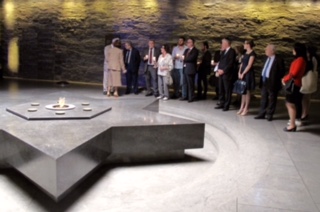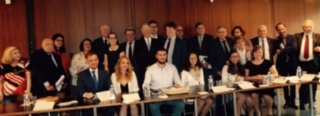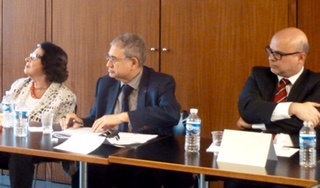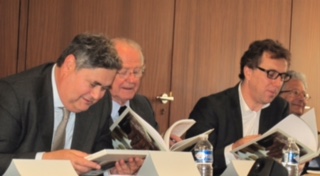“Normally held at UNESCO and under its auspices, the co-organizers considered this impossible as long as the April 2016 Resolution – denying Jewish ties to the Western Wall and the Temple Mount in Jerusalem – remains unrevoked.”
“Delegations to UNESCO present – Russia, United States, Germany, Armenia and Israel – pledged to find a solution to bring this unique programme back to UNESCO.”
“A Resolution can mark the start of the killing fields.”
Paris, 4 July 2016
The university Holocaust essay competition, co-organized by the Simon Wiesenthal Centre-Europe, the Association Verbe et Lumière-Vigilance (VL-V) and the Russian Holocaust Centre (RHC), each year invites to Paris the five student winner from across the former Soviet Union.
Normally held at UNESCO and under its auspices, the co-organizer's respective Boards – including this year's new partner, Yad vaShem France – felt this to be impossible in view of the April 2016 UNESCO Executive Board Resolution denying Jewish ties to the Western Wall and the Temple Mount in Jerusalem. The event was thus moved to the Paris Memorial to the Shoah.
The meeting began with a commemorative “Kaddish” prayer in the Memorial's crypt, led by VL-V Treasurer Edouard Fridman, who declared: “There are six million reasons to keep Holocaust programming away from UNESCO at this time.”

In the crypt.
Opened by the Memorial's President, Baron Eric de Rothschild, he congratulated the laureates, while regretting the situation with UNESCO.
Yad vaShem-France President, Pierre-François Veil, recalled the terrible price of the Soviet peoples in World War Two, and thanked the Memorial for replacing UNESCO as host.
A book, recently produced by the Shorashim group and published under the co-auspices of V&L-V and the Simon Wiesenthal Centre: “The Survivors' Cookbook – Grandmas Cook Gourmet,” was presented to the three Presidents: Rothschild, Veil and Odier. The collection illustrates the 24 top chefs of Israel with 24 Holocaust survivors producing their family recipes as an essay celebrating the zest for life.
Rothschild, Veil and Odier receiving the Survivors' cookbook.
The delegations to UNESCO present – Russia, United States, Germany, Armenia and Israel – pledged to find a solution to bring this unique programme back to UNESCO next year.

Memorial President Eric de Rothschild together with diplomats, laureates, speakers and members.
French Institute for International Relations (IFRI) scholar, Dominique Moisi, spoke of his father as one of the four survivors of a French convoy of 1,000 deportees to Auschwitz. He pointed to “the present populism and chauvinism...”, adding, “We are dancing on a volcano.”
Historian Shmuel Trigano analysed the synonyms for mass murder of Jews throughout history, recalling that “the end of the Jewish State and the two Temples in Antiquity was described as a 'Churban' or destruction, hinting at a parallel with the present delegitimization of Israel and the UNESCO deletion of the Jewish narrative.”
VL-V President Richard Odier argued that “a Resolution could mark the start of the killing fields.”
Simon Wiesenthal Centre Director for International Relations, Dr. Shimon Samuels, viewed “the forthcoming UNESCO World Heritage Committee in Istanbul as another expected arena for the identity theft of the Jewish narrative.”

Lt to rt: Alla Gerber, S. Samuels, Israel Embassy to UNESCO DCM Y. Moustaki.
Russian Holocaust Centre Chair, Alla Gerber, spoke of the incitement to antisemitism on both sides of the Russo-Ukrainian conflict and how Holocaust education can serve as a mitigating factor.
Her Co-Chair, Dr. Ilya Altman, spoke of the thousands of essay participants across the former Soviet Union over the last 12 years, who were touched by a better understanding of the Holocaust and its contemporary implications regarding the containment of extremism and the defence of democracy.
This was illustrated by Warwick University student Déborah Lévy who screened her film-clip: “Global Youth Voices for Holocaust Memory.”
Altman introduced the Laureates, each of whom presented an abstract of their research:
- Larisa Veselova, Moscow, Russia: “The Wartime Interpretation of the Holocaust in the Army Newspaper Krasnaya Zvezda('Red Star')”
- Alena Zaitseva, Buryatia, Russia: “The Forgotten Lessons of the Holocaust in Buryatia”
- Nikita Gordeev, Saratov, Russia: “Historical Revisionism in the Structure of Extremist Ideology: Socio-Political and Criminological Aspects”
- Anastasiya Maksimava, Minsk, Belarus: “Holocaust Denial – A Crime or Realization of the Right to Freedom of Speech”
- Narek Galstyan, Yerevan, Armenia: “Armenian Righteous Among the Nations.”
Samuels concluded with the hope that “the Holocaust Laureates project may serve – at this time of worrisome distrust between the West and the Russian Federation – to recall their alliance against Nazism and Fascism that threatened us all.”

